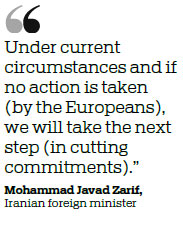Iran urges Europe to protect nuke deal
DUBAI - Iran will further cut its commitments to its international nuclear deal unless its European partners move to protect it from sanctions of the United States by ensuring it can sell oil and receive income, Iranian Foreign Minister Mohammad Javad Zarif told Iran state television on Wednesday.
"Under current circumstances and if no action is taken (by the Europeans), we will take the next step (in cutting commitments)," Zarif said, adding that its European partners should guarantee Iran could sell its oil and collect the revenue.
Iran has said it will reduce its commitment to the 2015 nuclear accord in stages and may even withdrew from the pact unless the Europeans find ways to shield its economy from the U.S. sanctions.

On Tuesday, French President Emmanuel Macron spoke with his Iranian counterpart, Hassan Rouhani, and reiterated his call for a de-escalation of tensions between Iran and the US, the Elysee said.
"It is France's role to make every effort to ensure that all parties agree to a break and open negotiations," the French presidency said.
The 2015 deal over Iran's nuclear program has begun to unravel since US President Donald Trump announced Washington was pulling out of the agreement last year and reimposed sanctions, to the dismay of European allies.
France, Britain and Germany were among the key players in the pact. China and the European Union also signed the pact, known as the Joint Comprehensive Plan of Action.
Macron had a "long" discussion with Rouhani during the French leader's annual holiday at his summer retreat, the medieval fort of Bregancon on France's Mediterranean coast, the Elysee said. Macron "recalled the need to initiate a de-escalation of tensions", it added.
Intense diplomacy
Paris has engaged in intense diplomacy seeking to solve the current tensions, with Macron's foreign policy adviser Emmanuel Bonne twice visiting Teheran.
Russian President Vladimir Putin is due to visit Macron in Bregancon in mid-August ahead of a G7 summit in Biarritz, France, which will present "new opportunities to discuss the Iranian issue", according to the Elysee.
Meanwhile, German Vice-Chancellor and Finance Minister Olaf Scholz said on Wednesday that he was very sceptical about a request by the US to join a military mission for the Strait of Hormuz.
The US has proposed stepping up efforts to safeguard the Strait of Hormuz in the Gulf, at a time of heightened tension between it and Iran. About one-fifth of the world's oil passes through the strait.
Washington had formally asked Berlin to join France and Britain in a mission to secure the strait and to "combat Iranian aggression", the US embassy in Berlin said on Tuesday.
"I'm very sceptical about that, and I think that's a skepticism that many others share," Scholz said.
Scholz said it was important to avoid a military escalation in the region and that such a mission carried the risk of being dragged into an even bigger conflict.
"That's why I think this is not a good idea," he said.
There is considerable opposition among Scholz's Social Democrats, junior partners in Chancellor Angela Merkel's ruling coalition, to getting involved in a US-led mission.
Asked whether the coalition parties shared the same view on the US request, Scholz said: "Yes, that's my impression." He said that Berlin still viewed the nuclear agreement with Iran as the best option to prevent it developing a nuclear bomb.
Agencies
(China Daily 08/01/2019 page11)














